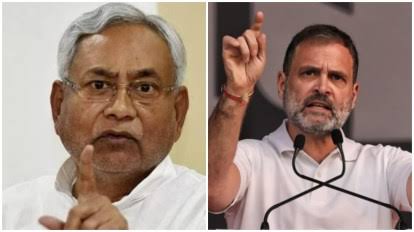In a scathing attack on Bihar Chief Minister Nitish Kumar, Congress leader Rahul Gandhi criticised the leader’s apparent propensity for taking U-turns under pressure. Speaking at a gathering in Purnea during his ongoing “Bharat Jodo Nyay Yatra,” Rahul asserted, “A little pressure is exerted, and he (Nitish Kumar) takes a U-turn.” The Congress leader took a humorous approach, sharing an anecdote about Nitish Kumar’s haste after realising he had left his shawl at the governor’s house.
The backdrop to Rahul’s comments is Nitish Kumar’s recent decision to walk out of the opposition alliance, Mahagathbandhan, and return to the NDA fold, aligning with the Bharatiya Janata Party. Nitish Kumar resigned as the chief minister of the Mahagathbandhan and swiftly took oath as the head of the NDA government in Bihar. The Congress, a key component of the Mahagathbandhan, reacted sharply, accusing Nitish Kumar of being akin to a chameleon for his frequent political color changes.
Rahul Gandhi, addressing the crowd, emphasized the Mahagathbandhan’s commitment to fighting for social justice in Bihar without Nitish Kumar’s involvement. He quipped, “We don’t require Nitish Kumar for that purpose, we don’t require him at all.” The Congress leader also highlighted the political humor circulating about Nitish Kumar’s swift return to the governor’s house, alluding to the leader’s agility in changing political allegiances.
Nitish Kumar’s primary objective seems to be retaining the position of Bihar’s Chief Minister, leading him to switch parties expediently to stay in power. This marks his fourth instance of such a move, indicating that his paramount concern revolves around occupying the chair of the Chief Minister in Bihar.
The Congress-JD(U) spat has intensified, with the JD(U) accusing the Congress of conspiring against regional parties and attempting to weaken them. Nitish Kumar, often referred to as the “Paltu Ram” of state politics, has switched political alliances four times in the last 11 years, showcasing a remarkable political flexibility that has drawn both criticism and amusement.
Rahul Gandhi presented a narrative suggesting that Nitish Kumar felt cornered after a caste survey, conducted under pressure from Mahagathbandhan partners, left him seeking an exit. Rahul claimed, “The BJP provided him with a way out.” According to Gandhi, the pressure from the Congress and RJD to conduct the caste survey compelled Nitish Kumar to seek refuge with the BJP.
In response, Gandhi asserted that the Congress had made it clear to Nitish Kumar that a caste survey was non-negotiable. He accused Nitish Kumar of succumbing to pressure and compromising with the BJP, a party that, according to Rahul, has traditionally opposed social justice. Despite Nitish Kumar’s maneuvering, Rahul Gandhi remained undeterred, stating, “He got scared, but we are not going to be afraid.”
Rahul Gandhi used the occasion to broaden the discussion beyond political alliances, emphasizing the importance of economic justice. He cited the example of ‘makhana’ (fox nuts) grown in abundance in Purnea and adjoining districts, linking economic prosperity to social justice. This pivot in focus reflects a broader narrative in which Rahul Gandhi seeks to connect with the electorate on issues beyond political alliances.
In conclusion, Nitish Kumar’s recent political flip-flop has not only intensified the political tussle in Bihar but has also become fodder for humor and criticism. The allegations of political pressure and opportunism underscore the complex dynamics of alliances and power play in Indian state politics.



